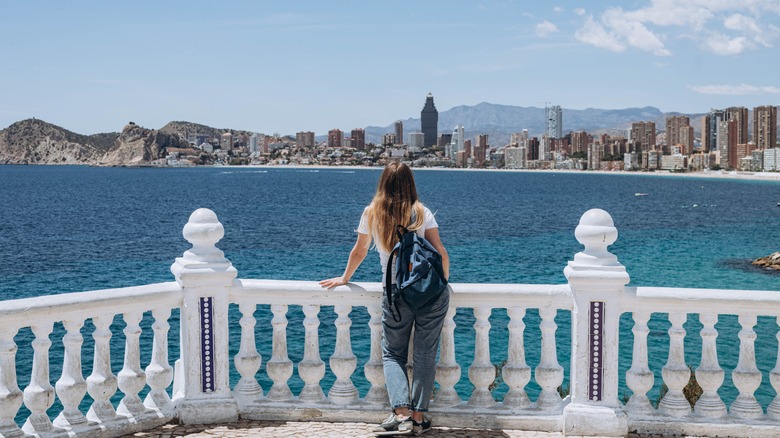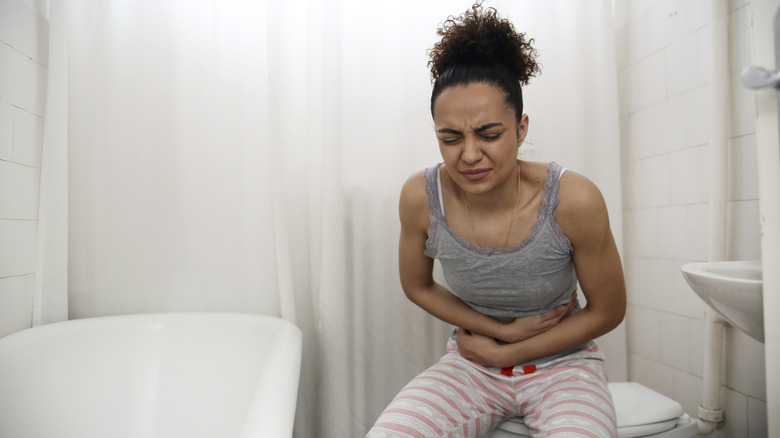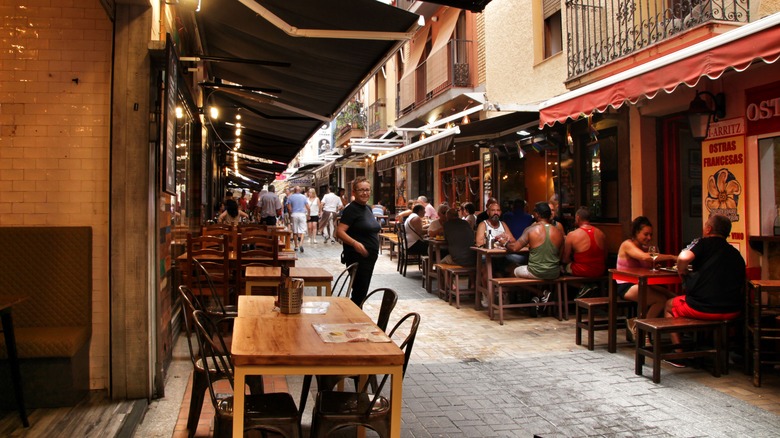Why Tourists Are More Likely To Get Sick Visiting This European Vacation Destination
When you imagine getting sick on vacation, you might think of developing "Bali belly" in Indonesia or an upset stomach from the tap water in Mexico. Or perhaps cruises spring to mind, where people can easily spread a mystery illness in the tight ship quarters. However, the (unfortunate) reality is that you can get sick anywhere, including during your next European getaway.
Forbes Advisor combed through online travel forums and advice from the NHS and the Centers for Disease Control and Prevention (CDC) to determine which destinations are most likely to make vacationers sick. While Punta Cana in the Dominican Republic was found to be the hotspot where travelers are most likely to get sick worldwide, Benidorm, Spain, a beachy resort town dotted with high-rises, took the top spot among European destinations. Forbes' researchers discovered that nearly 5% of all forum posts about Benidorm discuss food poisoning, tummy bugs, and other illnesses.
What's behind the illnesses in Benidorm?
Unlike some exotic destinations, the tap water in Benidorm, Spain, is considered safe to drink, and health organizations don't recommend any specific vaccinations before visiting the city. So what about Benidorm sends so many vacationers home with nausea and toilet troubles? It's unclear why the city has earned such an unfortunate reputation, but as it turns out, food poisoning and similar illnesses may be slightly more common throughout Spain than in other European countries. A 2015 survey (via MailOnline) revealed that 30% of British vacationers had fallen ill in Spain, far more than in any other country. Forbes Advisor also listed three other Spanish destinations in its top 10 in Europe based on the study's "Travel Bug Index Score."
Still, reports of illness in Benidorm on the website iwaspoisoned.com point to culprits that can be found in any country: undercooked chicken, suspicious hotel food, and questionable pork. Nevertheless, Spain has seen an uptick in viral illnesses plaguing travelers in recent years. In the summer of 2023, shigella sonnei, a drug-resistant gastrointestinal infection, was found in clusters in some parts of Spain. The year before, a man from the U.K. returned home from Benidorm with a severe case of Legionnaires' disease, a type of pneumonia that caused symptoms such as confusion, vomiting, and trouble breathing after noticing a dripping air conditioner in his hotel room.
How to avoid getting sick during your Spanish vacation
Compared to many of the other cities included in Forbes Advisor's study, Benidorm is a relatively low-risk place to visit in terms of contracting illnesses. Compared to Punta Cana's Travel Bug Index Score of 90.4 out of 100, Benidorm only earned a score of 26.4, and the risk of catching a stomach bug in the Spanish coast town is only one-third that of the Dominican destination.
However, that doesn't mean you're completely safe when visiting the popular European vacation spot. It's a good idea to take some preventative measures to stop a nasty bug from ruining your trip. First, regularly wash your hands for 20 seconds, especially after using the restroom and before eating or touching food. Since stomach viruses can travel on clothing, you might also want to take advantage of the hotel laundry services or the washer in your Airbnb to keep your clothes free of harmful germs.
There are also steps you can take to avoid food poisoning while traveling. For starters, research restaurants first, including inspection scores if available, before ordering a meal. Once you're served your food, make note of the temperature and if meats and eggs appear to be raw or undercooked. If your chicken looks pink or your egg seems overly runny, send it back to the chef or ditch the meal and go somewhere else.


